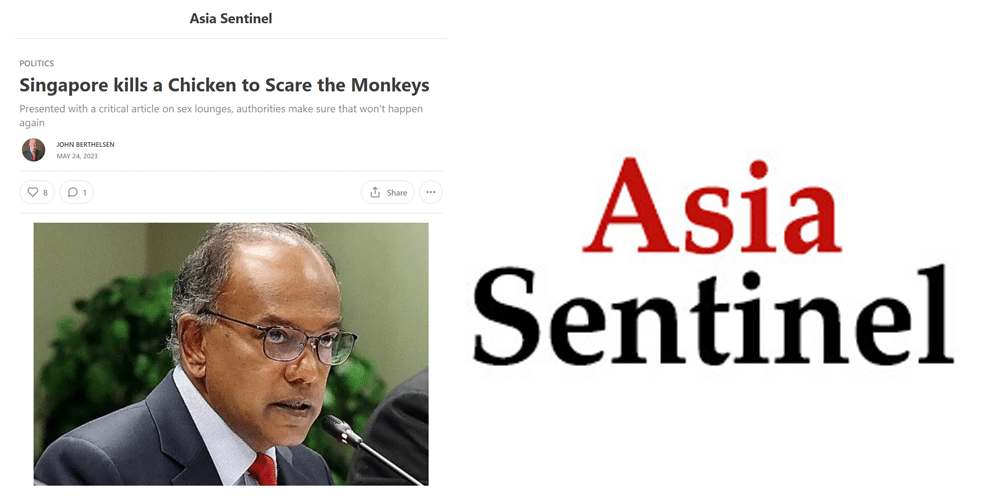SINGAPORE – California-based news outlet Asia Sentinel maintains its stand on the story, defending its position against the Singapore government’s alleged attempts to silence critics even as it complied with a correction order issued by the Minister of Home Affairs, K Shanmugam under the “Protection from Online Falsehoods and Manipulation Act of 2019” (POFMA).
The Singapore government had demanded a correction of the Asia Sentinel’s 24 May story, “Killing the Chicken to Scare the Monkeys,” citing it contained several factual inaccuracies.
In response, the media outlet posted the correction on its article as mandated by the POFMA, but remains unwavering in its stance on the story’s content and assertions.
The article featured an interview with Andy Wong Ming Jun, a critic of Singapore’s approach towards managing KTV lounges amid the COVID-19 crisis in 2021, and drew parallels between Wong’s experiences and those of human rights lawyer M Ravi and Prime Minister Lee Hsien Loong’s brother, Lee Hsien Yang.
In its statement on Monday (29 May), Asia Sentinel defended its report of an alleged threat made by an unnamed official at the Embassy of the Government of Singapore to end Nikkei Inc.’s business operations in Singapore, a claim which the Singapore government disputes. Asia Sentinel stated it had verified the threat from two anonymous sources.
Additionally, Asia Sentinel upheld its position that M Ravi’s suspension from practicing law was due to his criticism of the Singapore government’s prosecution of his client, Gobi Avedian, a stance countered by the Singapore government.
The news outlet cited an Amnesty International press statement asserting that Ravi’s suspension appears timed to stifle criticism of the death penalty.
The media outlet also stands by its report that Lee Hsien Yang and his wife Lee Suet Fern were compelled to leave Singapore out of fear for their safety, allegedly due to government action threatened against them over a family dispute with the Prime Minister.
“It is difficult to think of any other reason the two were forced to leave Singapore out of fear unless it was the use of the government’s power against them in what amounted to a family dispute. In fact, in a Facebook post on March 7, Lee Hsien Yang said he had been made a fugitive by his country for standing up for a promise to his late father, Singapore’s first Prime Minister Lee Kuan Yew. We would refer the government to Mr Lee’s Facebook page for further confirmation,” said Asia Sentinel.
This claim is also refuted by the Singapore government, which argues the couple left voluntarily and not due to government coercion.
Asia Sentinel contends that the POFMA, under which the correction order was issued, represents a draconian measure used by the Singapore government to muzzle criticism.
Despite complying with the correction order, Asia Sentinel strongly affirms that it stands by its story.
“We believe it is being used against Asia Sentinel because we reported fairly and completely on the controversy over the government’s attempts to silence a critic.”








